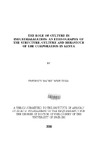| dc.description.abstract | This study was a comparative examination of the Kenyan corporate culture
as it contributes to making the society adapted in a knowledge-based
economy. It examined 152 corporations from all the sectors of the economy
within a period of 26 months (between November 1994 and January 1997)
in seven maj or urban areas in Kenya.
The general objective of the study was to find out the relationship between
the African cultural heritage, prevailing organisational structures and
consequent behavioural outcomes in corporations as they relate to success,
or lack of it, and change for the betterment of the Kenyan corporation in a
globalised and teleworked economy. The specific objectives were: to
establish the nature of the relationship between African cultural heritage
(ethnicity) and adaptation in a knowledge-based economy; how various
kinds of organisations perform in the Kenyan economy; to examine the
culture of inefficiency in the Kenyan corporation; to formulate and test
behaviour change theories and to examine the relationship between structure
(systems), culture and behaviour in the actual performance of a corporation.
Multi-stage stratified random sampling was conducted to obtain a sample of
22 corporations for participant observation, and 130 for a structured
interview. The sampling frame comprised membership records of various
umbrella organisations in Kenya. Data collection was conducted using
observation and participant observation, person centred ethnography, key
informants, structured and a semi-structured interview schedule, diary/daily
field notes and secondary sources of data. Qualitative data was analysed
using tables, diagrams and taxonomies while quantitative data was analysed
using SPSS for windows.
The main findings of the study are that cultural heritage does not affect one's
performance in a knowledge-based economy if the culture of the
organisation one works for is adapted to a knowledge-based economy and if
one is educated; private sector organisations perform better in the Kenyan
economy; the culture of vigilance, an inward looking consumption without
investment based culture is what ails the Kenyan corporation; RED model is
a better predictor of behaviour analysis and change than rational activity
models (R), emotive psychodynamics (E) and deterministic aspects of ecoculture
(D) in isolation; and structure, being just one .part of culture is not
adequate on its own to cause behaviour. The study recommends the strict
enforcement of the existing laws and vetting of appointees to head public
institutions as the way to reform the Kenyan economy. | en |

